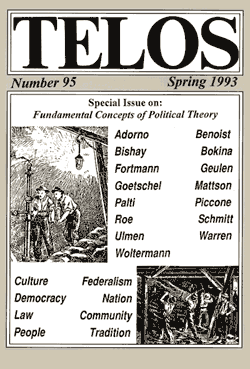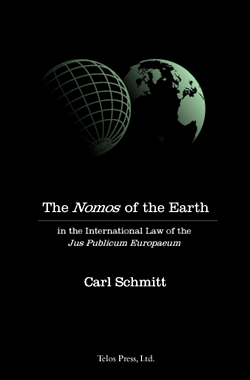As an occasional feature on TELOSscope, we highlight a past Telos article whose critical insights continue to illuminate our thinking and challenge our assumptions. Today, Michael Millerman looks at Carl Schmitt’s “Appropriation/Distribution/Production: Toward a Proper Formulation of Basic Questions of any Social and Economic Order” from Telos 95 (Spring 1993). Carl Schmitt’s The Nomos of the Earth in the International Law of the Jus Publicum Europaeum is available for purchase in our store.
 As indicated by its title, Carl Schmitt’s essay addresses to two problems: (1) what are the basic questions that we must raise about the social and the economic order? (2) how are those questions properly formulated? A moment’s reflection should reveal to us the great generality of these problems, which are designed—so Schmitt says—to answer a need for “comprehensive consideration” of social life in its unity (52). Whether we are asking about orders democratic, non-democratic, capitalist, or socialist; whether we inquire into totalitarianisms, fascisms, traditionalisms, ethno-nationalisms; whether we put the question to republics or princedoms, Schmitt is indicating that there are basic questions to ask, and he is suggesting that he has the key to their proper formulation.
As indicated by its title, Carl Schmitt’s essay addresses to two problems: (1) what are the basic questions that we must raise about the social and the economic order? (2) how are those questions properly formulated? A moment’s reflection should reveal to us the great generality of these problems, which are designed—so Schmitt says—to answer a need for “comprehensive consideration” of social life in its unity (52). Whether we are asking about orders democratic, non-democratic, capitalist, or socialist; whether we inquire into totalitarianisms, fascisms, traditionalisms, ethno-nationalisms; whether we put the question to republics or princedoms, Schmitt is indicating that there are basic questions to ask, and he is suggesting that he has the key to their proper formulation.
If part of the title indicates the problem, another part indicates the solution: the categories of appropriation, distribution, and production will help us to raise the right questions properly. These are, for Schmitt, the “immediately intelligible basic categories which allow a proper formulation of questions common to various disciplines” (52). They are “simple and authentic categories at once basic and inclusive” (52), the use of which “should help overcome the limitations of specialization without denying the value of achievements in the various disciplines” (52). What the title of Schmitt’s essay does not tell us, but what we learn from the essay itself, is that these categories are unfolding aspects of a more fundamental concept; they are its manifold meanings. That concept, the key to the comprehensive yet basic formulation of social problems, for Schmitt, is nomos.
 Before we even consider Schmitt’s discussion of the meanings of nomos, we should note that it is plausible to advance nomos as the basic social and economic concept. Of Plato’s last great work, called the Nomoi, or Laws, Thomas Pangle said the following: “I do not know of any important contemporary political or moral principle that is not subjected, in this work, to implicit questions and doubts.”[1] That is, a discussion of the concept of nomoi has the potential to span across all the basic questions of social and economic order, as Schmitt suggests.[2] We can also recall Seth Benardete’s observation about Herodotus’ Inquiry, or History, that it is concerned above all with the discovery of the noos or meaning of customs or nomoi, linking the terms noos and nomos as the most fundamental categories of Herodotus’ project[3]—Schmitt, too, we might say, sees in the search for the noos of nomos the basic task at hand. As these references to Plato and Herodotus show, we share Schmitt’s desire “to make the original meaning of nomos relevant to social problems” bypassing the “modern disciplinary abstractions” that fail to grasp it in its comprehensiveness (53).
Before we even consider Schmitt’s discussion of the meanings of nomos, we should note that it is plausible to advance nomos as the basic social and economic concept. Of Plato’s last great work, called the Nomoi, or Laws, Thomas Pangle said the following: “I do not know of any important contemporary political or moral principle that is not subjected, in this work, to implicit questions and doubts.”[1] That is, a discussion of the concept of nomoi has the potential to span across all the basic questions of social and economic order, as Schmitt suggests.[2] We can also recall Seth Benardete’s observation about Herodotus’ Inquiry, or History, that it is concerned above all with the discovery of the noos or meaning of customs or nomoi, linking the terms noos and nomos as the most fundamental categories of Herodotus’ project[3]—Schmitt, too, we might say, sees in the search for the noos of nomos the basic task at hand. As these references to Plato and Herodotus show, we share Schmitt’s desire “to make the original meaning of nomos relevant to social problems” bypassing the “modern disciplinary abstractions” that fail to grasp it in its comprehensiveness (53).
The three basic meanings of nomos are appropriation, distribution, and production (54–55). The broad scope of these meanings can be indicated by the fact that in German, as in Russian, the root relating to appropriation is involved in words meaning to understand, though the translator of Schmitt’s piece reminds us that its derivatives in English include also “economy, antinomy, nomology, nomothetic,” and even “nomad” (54, note 4). For Schmitt, distribution means, abstractly, “law and property, i.e., the part or share of goods.” Concretely, it means “for example, the chicken every peasant living under a good king has in his pot every Sunday; the piece of land he cultivates as his property; the car every worker in the US has parked in front of his house” (55). Production, for its part, means “to pasture, to run a household, to use, to produce” (ibid.). “To use” is perhaps the most accurate sense, since, for Schmitt, use includes, as does this meaning of nomos, both production and consumption (ibid.).
These categories are basic and comprehensive for the following reason: “Prior to every legal, economic, and social order, prior to every legal, economic, or social theory, there is this simple question: Where and how was it appropriated? Where and how was it divided? Where and how was it produced?” (56, italics in original). Schmitt presents and discusses numerous permutations of the order of these three categories. Different emphases and evaluations “both practically and morally in human consciousness” of these aspects of nomos follow both real historical changes and “even the image human beings have of themselves, of their world and of their historical situation” (ibid.).
In one case, land appropriation is the basis of the social order. “All known and famous appropriations in history, all great conquests—wars and occupations, colonizations, migrations and discoveries—indicate the fundamental precedence of appropriation over distribution and production” (56–57). In another, the socialist case, “the idea that imperialistic expansion, i.e., appropriation—especially land appropriation—should precede distribution and production was in itself medieval, not to say atavistic, reactionary, opposed to progress and ultimately inhuman” (59). Liberalism, too, concerns itself with the ordering of the aspects of nomos (ibid.). “Progress and economic freedom consist in freeing productive powers, whereby such an increase in production and in the mass of consumer goods brings about an end to appropriation so that even distribution is no longer an independent problem” (ibid.). Thus, at a very basic level, Schmitt is able to distinguish imperialism, socialism, and liberalism as each emphasizing some aspect of nomos, or ordering its meanings in a particular way.
However, to the extent that any of these approaches emphasizes appropriation, distribution, or production (use), it raises thereby “the old problem of the sequence and evaluation of the three original processes of social and economic life” (61). No “ism” or social order can “escape the fundamental question of the problematic sequence of appropriation, distribution, production” (ibid.). Schmitt is able to distinguish socialisms themselves from one another on the basis of this model, emphasizing the productive aspect of Fourier’s socialism and the distributive aspect of Proudhon’s (ibid.). What is more, he argues that Marx emphasized appropriation, since the historical dialectic amounts to “the great appropriation” of the “total means of production” (62), likening the “expropriation of the expropriators” to “the strongest imperialism”: both order appropriation before distribution and production (63).
Schmitt acknowledges that “it would appear all too simplistic to emphasize only the appropriating aspect of imperialism” (63). The point of his brief discussion, he reminds us, is merely “to indicate the usefulness of the three basic meanings of nomos and the problem of their sequence” (ibid.). He reinforces this aim at the end of his essay by relating his model to the question of world unity:
Has humanity today actually “appropriated” the earth as a unity so that there is nothing more to be appropriated? Has appropriation really ceased? Is there now only division and distribution? Or maybe only production remains? If so we must ask further: Who is the great appropriator, the great divider and distributor of our planet, the manager and planner of unified world production? This question should immediately warn us against ideological short-circuits. At work here are widespread and generally forceful (although scientifically superfluous) simplifications. They suggest fictional unities. Their simplifications can only be overcome by the deeper simplicity of original concepts. (64)
We should read and re-read Schmitt’s essay in order to see whether he delivers on this promise of deep simplicity through the original concept of the nomos and its three fundamental meanings.
Notes
1. Plato, Laws, trans. Thomas Pangl (Chicago: Univ. of Chicago Press, 1980), p. 375.
2. Indeed, Schmitt refers to a passage in the Laws as the classic formulation of the link between measure and distribution (57–58, note 13).
3. Seth Benardete, Herodotean Inquiries (South Bend, IN: St. Augustine’s Press, 2009), p. 29.








